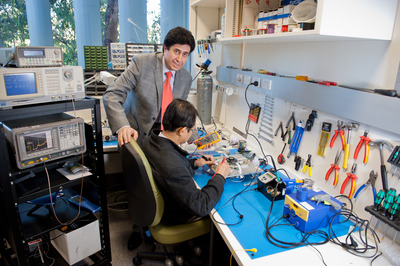Optical fibre provides optimal water monitoring
Edith Cowan University (ECU) researchers have developed a cost-effective water quality sensor utilising fibre-optic nanotechnology. The project was funded by the National Centre in Excellence in Desalination Australia (NCEDA).
The ECU Electron Science Research Institute (ESRI) team of Director Professor Kamal Alameh, Dr Feng Xiao and PhD student David Michel have created a thin, real-time monitoring sensor which can provide early warning of membrane fouling in desalination plants.

Salinity sensors play an important role in guarding against membrane fouling, measuring salinity and temperature levels in the desalination plants, and raising the alarm if they are too high. If not checked, a degraded membrane can affect the quality of the water produced and may require intense chemical cleaning or membrane replacement, increasing the costs of treatment plants.
Current sensor models are bulky, vulnerable to corrosion and typically require a power supply at each sensor node. The new fibre-optic sensors offer a more accurate, robust level of monitoring for desalination plants, according to Professor Alameh.
“They are the same thickness as a human hair,” he told participants at NCEDA’s recent research showcase at the centre’s Rockingham Desalination Research Facility on 15 May.
“An optical fibre costs just $7 for a 1 km length. Our fibre-optic sensors provide real-time information, acting as a warning system to imminent fouling by monitoring salinity values as low as 5 mg/litre.
“The sensors meet the required industry standard and can capture temperature, flow rate, pressure and salt passage.”
Professor Alameh believes that the sensors could also be used in the oil and gas industry.
“The laser light guided within the optic fibre is a unique feature which the oil and gas sector could also use to sense the quality of oil at deep levels, or sense gases in very harsh environments,” he said.
Professor Alameh and his team are currently investigating potential to commercialise the technology with NCEDA, industry partners and international collaborators including the Gwangju Institute of Science and Technology, the China Daheng Group and Southeast University Nanjing.
Data centres working to use water responsibly
Decisions that go into designing a new data centre will stay in place for many years to come, so...
Acoustic analysis helps protect a high-risk asset
A collaboration between Scottish Water and water solutions provider Xylem has netted a...
Future Made in Australia needs water to make it happen
Boosting technologies and manufacturing for a Future Made in Australia could get off to a healthy...









